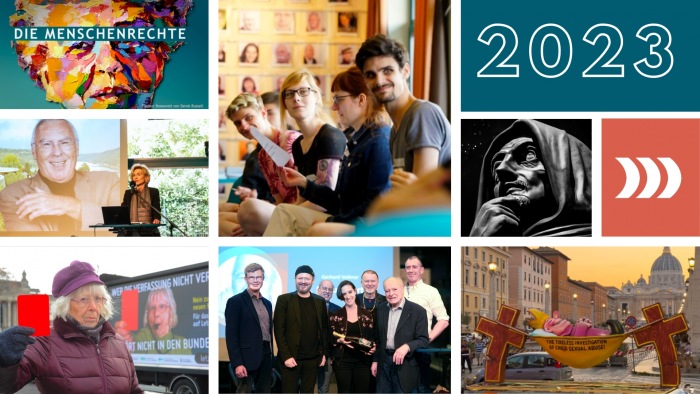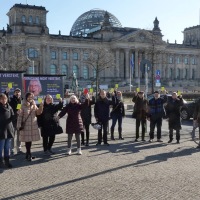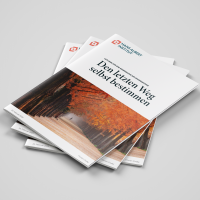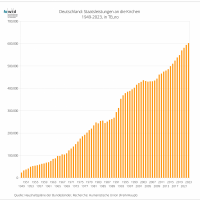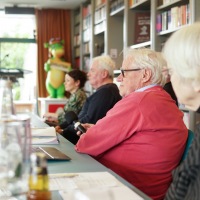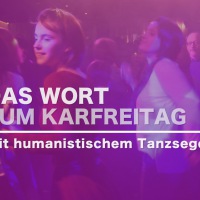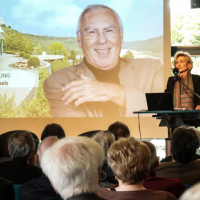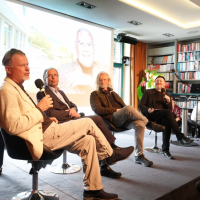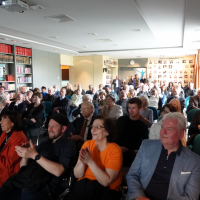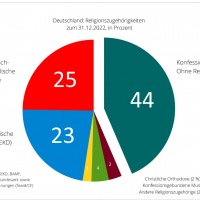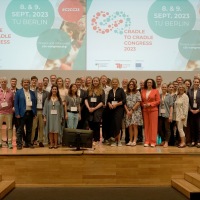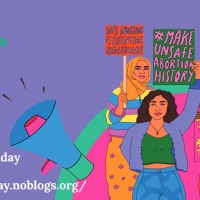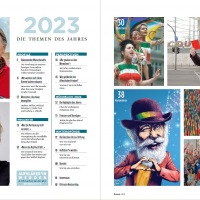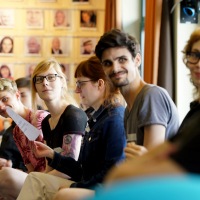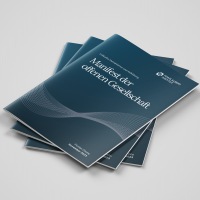gbs Annual Review 2023
A year full of crises and opportunities
In 2023, the Giordano Bruno Foundation (gbs) celebrated "100 Years of Evolutionary Humanism" – despite the ongoing challenges of COVID-19, war, and climate change. The year was overshadowed by the ongoing war in Ukraine and the Hamas attack on Israel. However, there was a silver lining as an increasing number of politicians began to recognize the urgent need to defend the open society against its resurgent enemies.
***
1st Quarter: January to March
January
1923 saw the publication of Julian Huxley's first book and Peter Kropotkin's last. This inspired the gbs to commemorate "100 Years of Evolutionary Humanism", countering the widespread doomsday scenarios of our time with the utopia of a "better world" under the motto "We believe in humanity...". This was in the spirit of the UN General Assembly's adoption of the "Universal Declaration of Human Rights" 75 years ago in the challenging post-war environment.
The series of events at the Kortizes Institute entitled "Vom Reiz der Sinne" (The Allure of the Senses) was also launched in January with the support of the gbs. This series explored how evolution has shaped the human brain and human perception. This was followed in the first quarter of the year by the Copernicus Symposium "Welt, Körper, Geist" (World, Body, Mind) which shed light on humanity's place in the universe, as well as the start of the series "Vom Reiz des Übersinnlichen" (The Allure of the Supernatural), which scientifically analyzed seemingly "paranormal" phenomena. The collaboration with Kortizes continued throughout the year and culminated in the major Kortizes Symposium "Naturgewalt und Geisteskraft" (Force of Nature and Power of Mind), featuring three gbs advisory board members (Christoph Antweiler, Axel Meyer, and Volker Sommer) as speakers.
February
"Those who do not understand the constitution have no place in the Bundestag!": In 2015, 140 sitting members of the German Bundestag voted in favor of the unconstitutional Section 217 of the German Criminal Code, which prohibited professional assisted suicide in Germany until it was overturned by the Federal Constitutional Court in 2020. In light of the planned new regulations for assisted suicide, the gbs (in cooperation with Dignitas, DGHS, and Verein Sterbehilfe) issued a "yellow card" to the relevant MPs to remind them of their "foul against the democratic rule of law" and to prevent them from repeating the same mistake. Coinciding with this high-profile campaign, the Hans Albert Institute (HAI) presented guidelines for a fact-based, rational and ideologically neutral regulation of assisted suicide in its statement "Den letzten Weg selbst bestimmen".
Concurrently with the assisted suicide initiative in Berlin, the Research Group on Worldviews in Germany (fowid) published a data sheet compiled by Johann-Albrecht Haupt (HU / ifw), showing that in 2023, for the first time, the churches received state payments exceeding 600 million euros. The absurdity of these payments, which according to the constitution should have been settled more than 100 years ago, was highlighted in an essay by ifw and gbs advisory board member Rolf Schwanitz (former Minister of State in the Federal Chancellery). Published on the Institute for Secular Law (ifw) website, he concludes that it is "neither reasonable nor justified" to allow "this billion-euro, century-old money rain to be followed by further compensation payments. All conceivable claims for compensation have already been settled".
March
At the annual meeting of the Institute for Secular Law held at the foundation's headquarters "Haus Weitblick", current topics such as the revision of the laws on abortion and assisted suicide were discussed. The Institute, which was founded by the gbs in 2017 and consists of high-ranking legal experts, concluded that abortion must be decriminalized and that there should be no further restrictions on the "Right to Last Aid". The ifw members also argued for the abolition of the so-called "blasphemy paragraph" (§ 166 of the German Criminal Code) and debated issues such as church labor law, the opaque secret negotiations between the federal government, the states, and the churches on the redemption of state benefits, ethics education, non-denominational schools, and the possibility of civil law compensation for victims of sexual abuse by clergy.
2nd Quarter April to June
April
Alle Jahre wieder erinnert die Giordano-Bruno-Stiftung daran, dass das "Tanzverbot" an Karfreitag laut einem 2016 erstrittenen Urteil des Bundesverfassungsgerichts nicht für diejenigen gilt, die aus weltanschaulichen Gründen gegen die "stillen Tage" antanzen. Aus diesem Grund fanden auch 2023 wieder zahlreiche Heidenspaß-Partys in Deutschland statt sowie Aufführungen des Monty-Python-Films "Das Leben des Brian", der aufgrund der Feiertagsgesetze eigentlich nicht öffentlich gezeigt werden darf.
Every year, the Giordano Bruno Foundation recalls that, according to a 2016 ruling by the Federal Constitutional Court, the "dancing ban" on Good Friday does not apply to those who oppose the "days of silence" for ideological reasons. As a result, in 2023, numerous "Heidenspaß" (Heathen's Fun) parties took place in Germany, as well as screenings of the Monty Python film "Life of Brian," which are technically not allowed to be shown in public on religious holidays.
A special kind of farewell: gbs founder Herbert Steffen, who died on 18 November 2022, did not want a mourning event shortly after his death. Instead, he wanted a celebration of his life at a later date, after the initial period of grief. On April 23, the foundation fulfilled the last wishes of the man whose "long journey from Paul to Saul" inspired many. The commemorative event, hosted by Ulla Wessels and Michael Schmidt-Salomon, was a celebration in true "Herbie" style, where tears were shed not only in sorrow but also in joy.
The foundation's late chairman would undoubtedly also have been delighted by the tireless efforts of the "11th Commandment" activist group led by gbs staff member David Farago: From April 17 to 18, the team supported the protest of victims of sexual abuse within the church with the "Hammock Bishop", a creation of gbs advisory board member Jacques Tilly and his team, coinciding with the release of the abuse study in the Diocese of Freiburg. Just two days later, Farago and his team, with two additional Tilly figures, participated in the finale of the Düsseldorf Enlightenment Service's (DA) citizens' initiative against the public funding of the "Evangelical Church Day 2027" in Düsseldorf.
May
"Von der Chance der Krise": Die erste Nationalversammlung am 18. Mai 1848 markierte einen Wendepunkt in der deutschen Geschichte. Erst die Krise der bestehenden Ordnung hatte den Weg zum demokratischen Parlament in der Paulskirche eröffnet. 175 Jahre später wird die Weltgesellschaft ebenfalls von Krisen erschüttert – sind auch sie mit Chancen verbunden? Mit dieser Frage beschäftigte sich eine Veranstaltung, die von der vhs Frankfurt und der gbs im Rahmen der offiziellen Feierlichkeiten zu "175 Jahren Paulskirche" organisiert wurde. Im Goldenen Saal des Frankfurter Stadthauses sprachen die Philosoph*innen Klaus-Jürgen Grün (Goethe-Universität Frankfurt), Irina Kummert (Ethikverband der Deutschen Wirtschaft) und Michael Schmidt-Salomon (gbs) unter der Moderation von Miriam Claudi (Studium Generale der vhs Frankfurt) darüber, ob auch in der gegenwärtigen Situation "mit der Gefahr das Rettende wächst", wie es Friedrich Hölderlin einmal formuliert hat.
"On the Opportunity of Crisis": The first National Assembly on 18 May 1848 marked a turning point in German history. It was the crisis of the existing order that paved the way for the democratic parliament in St Paul's Church. Now, 175 years later, global society is again shaken by crises – do they also bring opportunities? This question was the focus of an event organized by the Frankfurt Adult Education Center (vhs Frankfurt) and the gbs as part of the official celebrations to mark "175 years of St Paul's Church". In the Golden Hall of Frankfurt's Stadthaus, philosophers Klaus-Jürgen Grün (Goethe University Frankfurt), Irina Kummert (Ethics Association of German Business), and Michael Schmidt-Salomon (gbs), moderated by Miriam Claudi (Studium Generale of the vhs Frankfurt), discussed whether, in our current situation, "where there is danger, salvation also blooms", as Friedrich Hölderlin once put it.
Shortly after the grand foundation meeting in Oberwesel (May 12-14), the gbs participated in the campaign "Solidarity with Islam Researcher Susanne Schröter", in which around 850 public figures, including many university professors, called on politicians and the University of Frankfurt to defend the head of the Frankfurt Research Centre for Global Islam (FFGI) against alleged "woke" defamation. This statement was prompted by the attacks on Schröter following an event with former Green Party politician Boris Palmer, which had caused a stir in the media.
June
From June 7th to 11th, the "11. Gebot" team campaigned at the Protestant Church Congress in Nuremberg. This time, "Moses" with his stone tablet "You shall pay for your Church Convention yourself!" was accompanied by the "Naked Luther", which the group used to draw attention to the Christian hatred of Jews, which had catastrophic consequences in Nuremberg's history. In other respects, June 7th was a day of celebration, marking the 30th anniversary of the launch of the Great Ape Project (GAP), which aims to grant certain basic rights to great apes that have so far been exclusive to humans: the right to life, the protection of individual freedom and the prohibition of torture. Colin Goldner, gbs advisory board member and coordinator of the Great Ape Project in Germany, took the anniversary as an opportunity to explain the highs and lows in the history of the initiative, which was revived by the gbs in 2011 and is now one of the most important projects in the international animal rights movement.
What is humanity doing in the Anthropocene? What are the opportunities and risks of artificial intelligence? And what dangers are associated with narrow debate spaces? These were just a few of the topics explored by the scholars of the Bertha von Suttner-Studienwerk during their meeting from June 16th to 18th at the gbs foundation's headquarters "Haus Weitblick". The scholars praised the "wonderful atmosphere" in Oberwesel and the "many interesting discussions", which often lasted well into the night.
3rd Quarter: July to September
July
In 2021, the "Hängmattenbischof" ("11 years of tireless investigation of the abuse cases") in front of Cologne Cathedral made international headlines; in July 2023, the "11. Gebot" campaign group returned to the cathedral square with "Zappel-Woelki". Tilly's large sculpture shows Cardinal Woelki desperately clinging to Cologne Cathedral amid the diabolical threat of the abuse scandal, causing one of its towers to collapse. This caused as much amusement in Cologne as the accompanying poem in the style of "Struwwelpeter": "Ob der Woelki heute still / Wohl bei Tische sitzen will?" / Also sprach in ernstem Ton / Papa Staat zu seinem Sohn / Und Mutter Kirche blicket stumm / Auf dem ganzen Tisch herum [...]." (In English: "Can Woelki today be calm, at the table without qualm?" / Spoke Papa State with a serious air / To his son sitting there / And Mother Church in silent gaze / Scanned the table in a quiet daze [...].")
A few days after the Cologne protest, the second gbs Summer Forum took place at "Haus Weitblick", where bright young minds developed ideas on how the philosophy of evolutionary humanism can be better implemented in society. The mood was further lifted by the good news that both proposed legislative initiatives to reorganize assisted suicide failed in the German Bundestag vote, which the Giordano Bruno Foundation, which had campaigned for precisely this (including with its campaign in February 2023), commented on accordingly.
August
The erosion of faith continues. This is the conclusion of an analysis published in August 2023 by the Research Group on Worldviews in Germany (fowid), which was initiated by the gbs in 2005. According to the report, in 2022 only 48 percent of Germans were still members of one of the two major Christian churches, while the proportion of those without religious affiliation rose to 44 percent. According to fowid director Carsten Frerk, the extent of the trend towards secularization is particularly evident in the fact that only 6 percent of the population actively practice their faith. Frerk's analyses corroborated later that year by the "Church Membership Survey" conducted by the Protestant Church in Germany (EKD), whichfound that the proportion of secular-minded people in Germany (regardless of nominal church membership) is already at 56 percent.
August 2023 also marked the 100th birthday of the Austrian composer, conductor, and author Gerhard Wimberger. The Giordano Bruno Foundation commemorated its advisory board member, who passed away in 2016, with an unusual video collage of Wimberger's last major work – the "Passion Giordano Bruno", which had enthralled audiences 10 years earlier at the 2013 Salzburg Festival. For the first time, the gbs used artificial intelligence tools in this video, which would certainly have pleased the tech-savvy composer Gerhard Wimberger (see the press release on the video collage for more information about the genesis of the "Giordano Bruno Passion").
September
September vividly showcased the broad range of topics covered by the Giordano Bruno Foundation (gbs): The month began with the gbs supporting the "8th International Cradle to Cradle Congress", held under the patronage of the Federal Ministry for Economic Affairs and Climate Protection from September 8-9 at the Technical University of Berlin. Following this, the foundation was one of the backers of the "Safe Abortion Day", emphatically advocating for the repeal of § 218 of the German Criminal Code. Shortly after, the foundation participated in a protest by international church abuse victims at the gates of the Vatican, leading to frantic responses from the Italian law enforcement authorities. The fact that the Roman police banned the "Hängemattenbischof" ("Hammock Bishop") from taking part in the demonstration and even the carrying of the gbs banner "Aufklärung auf Katholisch" ("Enlightenment, Catholic Style)" garnered significant media attention. Meanwhile, the two "secular Rome pilgrims" David Farago and Ricarda Hinz handed over the prohibited enlightenment banner to the "House of History" in Bonn.
The diversity of the Foundation's topics is also reflected in the latest issue of the "bruno." annual magazine, released at the end of September 2023. On the cover of "bruno." 2023, Charles Darwin delivers "the good news of evolutionary humanism" with a wink, according to which we must "expect the worst, but hope for the best". The cover story of this issue shows: Although the challenges facing humanity in the "Anthropocene" are daunting, we should not overlook that even dramatic crises (such as the "climate crisis") come with opportunities. A final swan song for our species would be premature.
4th Quarter: October to December
October
Since October 2023, the Bertha von Suttner-Studienwerk (BvS), co-founded by the gbs, has been supporting 31 scholarship holders. More than 230 applications were submitted for the "Suttner Scholarship 2023", posing a challenging task for the BvS selection committee to pick the top 16 candidates from the large pool of qualified young academics. Including the 10 alumni whose funding expired in October 2023, 41 "exceptional young talents" have now benefited from the Studienwerk's programme.
The joy over the new scholarship holders was overshadowed at the beginning of October by the horror of the Hamas terrorist attack against Israeli men, women, and children. gbs spokesperson Michael Schmidt-Salomon initially responded with a short statement calling for a "new era" in dealing with political Islam. Shortly afterwards, he published an excerpt from his 2016 book "Die Grenzen der Toleranz" (The Limits of Tolerance) on "Islamic Fascism" to counter common misinformation about Hamas's motivations. In a detailed article titled "Symbolic Politics is Not Enough!", the gbs outlined necessary steps for more effectively defending the open society. In the meantime, some demands that the gbs has been making for years have been realized. For example, the first steps have been taken to put a stop to the Islamic Centre Hamburg, known as the Iranian mullah regime's hub in Germany. Whether these are short-lived reactions or signify a real change in addressing militant and legalistic Islamism remains to be seen.
Am 24. Oktober musste die gbs den Tod des deutschen Soziologen, Philosophen und Wissenschaftstheoretikers Hans Albert (Gründungsbeirat der Giordano-Bruno-Stiftung und Namensgeber des 2020 gegründeten Hans-Albert-Instituts) bekanntgeben. Albert, der zu den weltweit führenden Vertretern des Kritischen Rationalismus zählte, starb in seiner Heimatstadt Heidelberg im Alter von 102 Jahren. Zu seinem 100. Geburtstag hatte die Stiftung die Videodokumentation "Hans Albert - Der Jahrhundertdenker" produziert, die anlässlich seines Todes noch einmal über die Social-Media-Kanäle der gbs verbreitet wurde.
Ende Oktober zeigte sich, dass zivilgesellschaftliches Engagement tatsächlich etwas bewegen kann. Die Verhandlungsführer des Europäischen Parlaments verständigten sich nämlich darauf, von der geplanten anlasslosen Massendurchleuchtung privater Kommunikation abzusehen. Möglich wurde diese "historische Einigung", die (im Kontrast zu den ursprünglichen Plänen der EU) das Recht auf anonyme Kommunikation unangetastet lässt, nur "unter dem Eindruck massiver Proteste gegen die drohenden verdachtslosen Chatkontrollen", wie der Europaabgeordnete Patrick Breyer (Piratenpartei) schrieb. . Die Giordano-Bruno-Stiftung war an diesen Protesten aktiv beteiligt: Schon vor zwei Jahren hatte sie mit einer aufsehenerregenden Aktion vor einer anlasslosen Massenüberwachung und einer Aufhebung des digitalen Briefgeheimnisses in der EU gewarnt.
November
Am 21. November reagierte das Hans-Albert-Institut (HAI) auf das "50-Punkte-Manifest" der BILD-Zeitung, das angeblich verdeutlichen sollte, "was unsere freie Gesellschaft zusammenhält", mit einem alternativen "50-Punkte-Entwurf". Das von HAI-Koordinator Florian Chefai verfasste "Manifest der offenen Gesellschaft" formuliert aus kritisch-rationaler und humanistischer Perspektive politische Leitlinien, die tatsächlich dazu beitragen könnten, "klare Kante" zu zeigen und das Profil der offenen Gesellschaft zu stärken.
Zwei Tage später fand in Berlin die Anhörung der "Kommission für reproduktive Selbstbestimmung und Fortpflanzungsmedizin" statt, die von der Bundesregierung eingesetzt wurde, um Regelungen für den Schwangerschaftsabbruch außerhalb des Strafgesetzbuchs zu prüfen. Bei diesem Termin kamen mit gbs-Beirat Philipp Möller (Vorsitzender des Zentralrats der Konfessionsfreien) und Jessica Hamed (Stellvertretende Direktorin des ifw) gleich zwei Personen aus dem gbs-Spektrum zu Wort. Während Möller die religiösen Vorstellungen kritisierte, die sich hinter der Kriminalisierung des Schwangerschaftsabbruchs verbergen, stellte Hamed klar, dass es rechtsunlogisch sei, Blastozyten, Embryos oder Föten als Grundrechtsträger zu betrachten, weshalb sich jede Kriminalisierung des selbstbestimmten Schwangerschaftsabbruchs von vornherein verbiete. Hierzu hatte das ifw bereits im Oktober eine von Jessica Hamed, Michael Schmidt-Salomon und Jörg Scheinfeld verfasste Stellungnahme veröffentlicht, die sich u.a. auf Artikel 1 der UN-Menschenrechtserklärung stützt. Dort heißt es nämlich aus guten Gründen, "dass alle Menschen mit Würde und Rechten geboren sind – nicht gezeugt oder empfangen."
Am 25. November wurde am gbs-Sitz in Oberwesel der "Festakt zum 80. Geburtstag von Gerhard Vollmer" zelebriert. Die Veranstaltung stellte Vollmers herausragende Bedeutung für die Entstehung der "evolutionären Erkenntnistheorie" und die Verbreitung eines "naturalistischen Weltbildes" heraus, das die philosophische Grundlage für die Arbeit der gbs bildet. Aus Anlass des runden Geburtstages hatten das HAI, die gbs und die Bundesarbeitsgemeinschaft humanistischer Studierender bereits zuvor einen Wettbewerb unter dem Vollmerschen Motto "Wir irren uns empor!" ausgeschrieben. Die Gewinnerbeiträge werden zusammen mit den Festvorträgen von Michael Schmidt-Salomon, Volker Sommer, Rüdiger Vaas und Franz Josef Wetz in der nächsten Ausgabe der gbs-Schriftenreihe erscheinen. Darüber hinaus ist eine ausführlichere Festschrift für Gerhard Vollmer im Hirzel-Verlag geplant.
December
Zum 75. Jahrestag der Verabschiedung der Allgemeinen Erklärung der Menschenrechte (AEMR) durch die Vereinten Nationen veröffentlichte die gbs ein rund 20-minütiges Video, das erklärt, wie die Menschenrechte entstanden sind, weshalb sie aktuell in besonderer Weise bedroht werden und wie wir sie gegen die "Internationale der Nationalisten" verteidigen könnten. In der Abschlussmoderation des Videos heißt es dazu: "Die weltweite Durchsetzung der Menschenrechte wird kaum durch Politiker erfolgen, die sich in erster Linie für nationale Interessen engagieren. Die Weltzivilgesellschaft muss hier Verantwortung übernehmen: Es liegt an uns, die Grenzen in den Köpfen zu überwinden."
Fazit
2023 war das erste Jahr nach dem Tod des Stiftungsgründers Herbert Steffen. Er fehlte vor allem bei den zahlreichen Treffen und Veranstaltungen, die am Stiftungssitz "Haus Weitblick" stattfanden. Dennoch musste die Stiftungsarbeit natürlich weitergehen. Das gbs-Team (vor allem die Vorstandsmitglieder Michael Schmidt-Salomon und Ulla Wessels, das Kuratorium und der Mitarbeiterstab) dankt in diesem Zusammenhang allen Freunden und Förderern, Stiftungsmitgliedern und Kooperationspartnern, die es ermöglicht haben, dass die gbs ihre Aktivitäten in diesem Jahr nicht nur fortsetzen, sondern sogar noch ausweiten konnte!
Insgesamt war 2023 ein (durch die außenpolitischen Entwicklungen) zwar hochdramatisches, für die gbs jedoch nicht minder erfolgreiches Jahr: So konnte die Stiftung ihren Teil dazu beitragen, dass sowohl die Einschränkung des "Rechts auf Letzte Hilfe" in Deutschland als auch die Aufhebung des digitalen Briefgeheimnisses in der EU verhindert wurde. Darüber hinaus stehen mittlerweile – nicht zuletzt auch dank der juristischen Expertise des ifw – die Chancen nicht allzu schlecht, dass § 218 StGB in absehbarer Zeit tatsächlich fällt – ein Ziel, für das sich die Frauenbewegung seit 150 Jahren unermüdlich eingesetzt hat.
Im kommenden Jahr wird die gbs ihr 20-jähriges Bestehen feiern können. Seit Längerem ist sie ein wichtiger Rückhalt für alle Initiativen, die kritisch-rationale, evidenzbasierte, humanistische Positionen in der Gesellschaft stärken wollen. Wie es scheint, hatte gbs-Gründer Herbert Steffen recht, als er mit Blick auf die vielfältigen Projekte, die aus der gbs hervorgegangen sind, im ersten gbs-Jahresmagazin ("bruno." 2019, S. 18) formulierte: "Wenn es die gbs nicht schon gäbe, müsste man sie glatt erfinden!"
***

